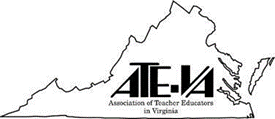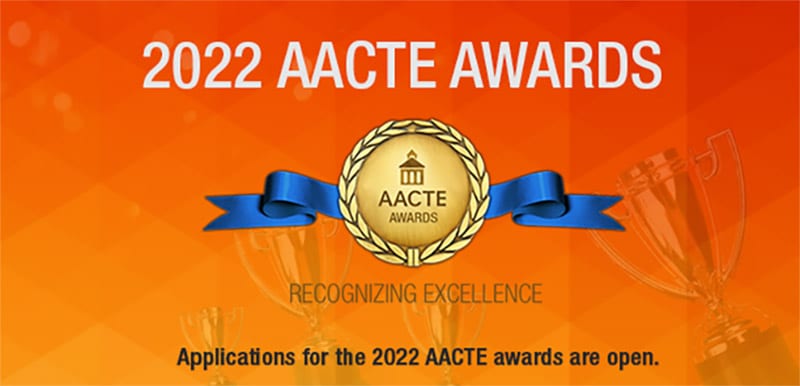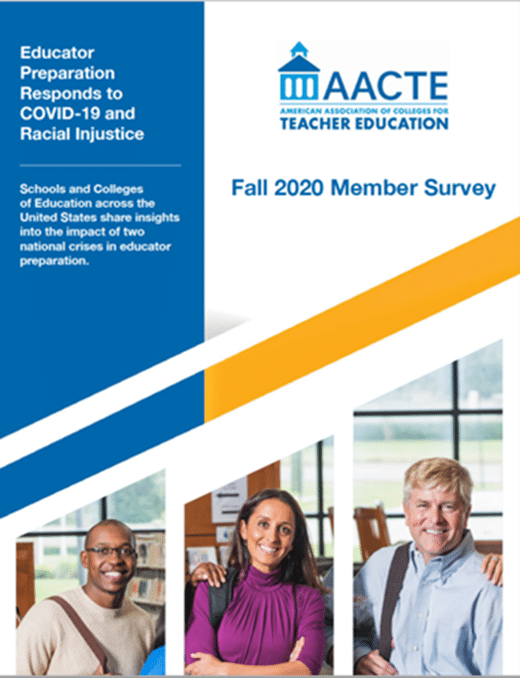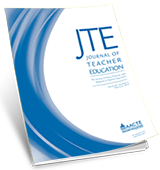05 Oct2021
By NAEd
 The Evaluating and Improving Teacher Preparation Programs commissioned paper series is part of the Evaluating and Improving Teacher Preparation Programs project by the National Academy of Education (NAEd) that aims to identify best practices among existing models of evaluation tools and provide recommendations for the development of new models.
The Evaluating and Improving Teacher Preparation Programs commissioned paper series is part of the Evaluating and Improving Teacher Preparation Programs project by the National Academy of Education (NAEd) that aims to identify best practices among existing models of evaluation tools and provide recommendations for the development of new models.
The commissioned papers will be published on a rolling basis, and the first two papers are released now.
Download both papers.
01 Sep2021
By Kristien Zenkov
 The Teacher Educators’ Journal, is the journal of the newly formed Virginia Association of Colleges and Teacher Educators (from the merging of ATE-Virginia and the Virginia Association of Colleges for Teacher Education). The journal is published once per year, in electronic form. Please review the call for proposals as we continue to expand the reach—research shared and readership—of the journal beyond Virginia.
The Teacher Educators’ Journal, is the journal of the newly formed Virginia Association of Colleges and Teacher Educators (from the merging of ATE-Virginia and the Virginia Association of Colleges for Teacher Education). The journal is published once per year, in electronic form. Please review the call for proposals as we continue to expand the reach—research shared and readership—of the journal beyond Virginia.
The Call
The Teacher Educators’ Journal (TTEJ) is published by the Virginia Association of Colleges and Teacher Educators (VACTE), a state unit of the Association of Teacher Educators (ATE) and the American Association of Colleges for Teacher Education (AACTE). The journal aims to stimulate discussion and reflection about issues related to teacher education. Manuscripts submitted for consideration may be research/empirical reports and analyses, position papers, book reviews, or conceptual essays.
26 Aug2021
By Bryan Zugelder
We are currently seeking contributing authors for a book with IGI Global, for release in 2022, titled The Educator Continuum and Development for Teachers. This peer-reviewed, edited book is designed to expand upon the body of research related to the educator continuum with a holistic view of teacher development. The theoretical paradigm of the book posits that educators grow in stages and thrive when provided with support at early stages of recruitment into the profession to innovation in teacher education through continued growth in teacher leadership and demonstration of extraordinary leadership as influencers of the profession. This book combines theory, concepts, and research studies that pinpoint facets of the educator continuum, providing researchers with scholarly contributions that advance the profession.
Education researchers and practitioners are invited to submit a 1,000 to 2,000 word chapter proposal by September 29, 2021.
17 Aug2021
By Linda Minor

Time is running out. Have you, or someone you know, received their doctorate since January 1, 2020 and are eligible to apply for the AACTE Outstanding Dissertation Award? The deadline to submit an application is Friday, August 20.
This award recognizes excellence in research (or its equivalent) that contributes to the knowledge base of educator preparation or of teaching and learning with implications for educator preparation.
The Outstanding Dissertation Award, overseen by AACTE’s Committee on Research and Dissemination, includes a $1,000 cash prize, as well as special recognition at AACTE’s 74th Annual Meeting in New Orleans, LA, March 4-6, 2022.
The primary selection criterion is quality of scholarship. The narrative summary file should answer the following questions about the dissertation:
05 Aug2021
By Linda Minor
 The AACTE 2022 Outstanding Dissertation Award deadline is quickly approaching. Submit your application by August 20 through the online submission system. This award recognizes excellence in research (or its equivalent) that contributes to the knowledge base of educator preparation or of teaching and learning with implications for educator preparation. The Outstanding Dissertation Award includes a $1,000 cash prize, as well as special recognition at AACTE’s 74th Annual Meeting in New Orleans, LA, March 4-6, 2022.
The AACTE 2022 Outstanding Dissertation Award deadline is quickly approaching. Submit your application by August 20 through the online submission system. This award recognizes excellence in research (or its equivalent) that contributes to the knowledge base of educator preparation or of teaching and learning with implications for educator preparation. The Outstanding Dissertation Award includes a $1,000 cash prize, as well as special recognition at AACTE’s 74th Annual Meeting in New Orleans, LA, March 4-6, 2022.
Who’s eligible?
Individuals receiving a doctorate since January 1, 2020 are eligible to apply for this award. The primary selection criterion is quality of scholarship.
What should you include in your entry?
The narrative summary file should answer the following questions about the dissertation:
15 Jul2021
New Book Offers Latest Research on How to Avoid Issues Around Role Ambiguity
By Genevieve Robinson
The initial call for chapters for the recently released Empowering Formal and Informal Leadership While Maintaining Teacher Identity was published in Ed Prep Matters in 2020. Several contributing author teams are AACTE members.
 While national competencies continue to define dispositional and knowledge base for teacher leaders, Bryan Zug elder, associate dean for academic affairs and partnerships in the College of Education at James Madison University (USA), saw a need to expand the body of scholarship on this topic.
While national competencies continue to define dispositional and knowledge base for teacher leaders, Bryan Zug elder, associate dean for academic affairs and partnerships in the College of Education at James Madison University (USA), saw a need to expand the body of scholarship on this topic.
He has over 15 years of experience working in education and is also currently working as an associate professor in the Department of Learning, Technology, and Leadership Education, where he serves as faculty and program director for the Graduate Certificate and Master of Education with a Concentration in Teacher Leadership programs. He explains his motivations and discoveries for his latest publication, Empowering Formal and Informal Leadership While Maintaining Teacher Identity:
06 Jul2021
By Linda Minor

The deadline is approaching for the AACTE 2022 Outstanding Dissertation Award. Applications can be submitted through the online submission system now through August 20. This award includes a $1,000 cash prize, as well as special recognition at AACTE’s 74th Annual Meeting in New Orleans, LA, March 4-6, 2022.
The Outstanding Dissertation Award, overseen by AACTE’s Committee on Research and Dissemination, recognizes excellence in research (or its equivalent) that contributes to the knowledge base of educator preparation or of teaching and learning with implications for educator preparation.
14 Jun2021
By Linda Minor
 Why wait to submit your application for the 2022 AACTE Awards? Avoid the stress of a last-minute rush and submit your entry early. AACTE Awards can be either self-nominated or nominated by a third party. To submit your nomination, visit AACTE’s online submission site.
Why wait to submit your application for the 2022 AACTE Awards? Avoid the stress of a last-minute rush and submit your entry early. AACTE Awards can be either self-nominated or nominated by a third party. To submit your nomination, visit AACTE’s online submission site.
Winning entries will be selected by AACTE’s Programmatic Advisory Committees and recognized formally at the 2022 Annual Meeting, March 4-6, in New Orleans, LA.
This is the 26th year AACTE’s awards program has been recognizing member institutions’ exemplary programs as well as individuals who have made noteworthy contributions to education preparation. For an overview of the 2021 award winners, see this press release.
24 May2021
By JTE Insider

Photo by Allison Shelley for EDUimages
Listen to the recent JTE Insider podcast by the Journal of Teacher Education (JTE) editorial team. This blog is available to the public, and AACTE members have free access to the articles in the JTE online archives—just log in with your AACTE profile.
This podcast interview features insights from the article “Preparing Teachers for Relationships with Students: Two Visions, Two Approaches” by Victoria Theisen-Homer. The article was published in the May/June 2021 issue of the Journal of Teacher Education.
21 May2021
By JTE Insider
 Listen to the recent JTE Insider podcast by the Journal of Teacher Education (JTE) editorial team. This blog is available to the public, and AACTE members have free access to the articles in the JTE online archives—just log in with your AACTE profile.
Listen to the recent JTE Insider podcast by the Journal of Teacher Education (JTE) editorial team. This blog is available to the public, and AACTE members have free access to the articles in the JTE online archives—just log in with your AACTE profile.
This podcast interview features insights from the article “Proposing Core Practices for Social Studies Teacher Education: A Qualitative Content Analysis of Inquiry-Based Lessons” by Alexander Cuenca. The article was published in the May/June 2021 issue of the Journal of Teacher Education.
23 Apr2021
By Linda Minor
 AACTE wants to recognize individuals and institutions for significant contributions to the field of educator preparation. Applications for the 2022 AACTE awards are now open. For most of the awards, programs and individuals can be either self-nominated or nominated by a third party. To submit your nomination, visit AACTE’s online submission site.
AACTE wants to recognize individuals and institutions for significant contributions to the field of educator preparation. Applications for the 2022 AACTE awards are now open. For most of the awards, programs and individuals can be either self-nominated or nominated by a third party. To submit your nomination, visit AACTE’s online submission site.
In identifying notable programs, practices, activities, writing, and research, these awards encourage all member institutions to strengthen the profession of teacher preparation through innovation, high standards, and leadership.
Entries for the Outstanding Book Award are due May 14 and entries for the Outstanding Dissertation Award are due August 20. The due date for all other award submissions is October 8.
16 Apr2021
By Gaelle Gilbert
 The professional journal for teacher education, Phi Delta Kappan recently published an article about the effects of COVID-19 on teacher education programs, delving deeper into the under reporting of these programs’ struggles caused by the pandemic. The article references AACTE’s two-part member survey that chief representatives of its member institutions responded to about how the twin crises of COVID-19 and racial injustice had affected their educator preparation programs and how they have responded to these crises. The results were included in a report by Jacqueline King released in February.
The professional journal for teacher education, Phi Delta Kappan recently published an article about the effects of COVID-19 on teacher education programs, delving deeper into the under reporting of these programs’ struggles caused by the pandemic. The article references AACTE’s two-part member survey that chief representatives of its member institutions responded to about how the twin crises of COVID-19 and racial injustice had affected their educator preparation programs and how they have responded to these crises. The results were included in a report by Jacqueline King released in February.
Authors Kathryn Choate, Dan Goldhaber, and Roddy Theobald underscore that one of the most relevant issues facing educator preparation programs is the cut in clinical practice available to teacher candidates. To help move these students journeys forward, several states have passed emergency legislation relaxing teacher certificate requirements. The article cites AACTE’s Member Survey to re-enforce the changes happening within these programs—namely the 188 educator preparation programs (across 47 states) that have transitioned, at least partly, to a remote learning environment in Spring 2020.
09 Apr2021
By Linda Minor
 Have you recently completed a doctoral dissertation related to educator preparation? AACTE is now accepting application for its annual Dissertation Award, recognizing excellence in research (or its equivalent) that contributes to the knowledge base of educator preparation or of teaching and learning with implications for educator preparation. Overseen by AACTE’s Committee on Research and Dissemination, this award includes a $1,000 cash prize, as well as special recognition at AACTE’s 74th Annual Meeting in New Orleans, LA, March 4-6, 2022.
Have you recently completed a doctoral dissertation related to educator preparation? AACTE is now accepting application for its annual Dissertation Award, recognizing excellence in research (or its equivalent) that contributes to the knowledge base of educator preparation or of teaching and learning with implications for educator preparation. Overseen by AACTE’s Committee on Research and Dissemination, this award includes a $1,000 cash prize, as well as special recognition at AACTE’s 74th Annual Meeting in New Orleans, LA, March 4-6, 2022.
Applications for AACTE’s 2022 Outstanding Dissertation Award are now being accepted in our online submission system now through August 20.
06 Apr2021
By JTE Insider
 Listen to the recent JTE Insider podcast by the Journal of Teacher Education (JTE) editorial team. This blog is available to the public, and AACTE members have free access to the articles in the JTE online archives—just log in with your AACTE profile.
Listen to the recent JTE Insider podcast by the Journal of Teacher Education (JTE) editorial team. This blog is available to the public, and AACTE members have free access to the articles in the JTE online archives—just log in with your AACTE profile.
This podcast interview features insights from the article “Examining Preservice Teachers’ Perceptions of Planning for Culturally Relevant Disciplinary Literacy“ by Dr. Jamie Colwell, Kristen Gregory, and Valerie Taylor. The article was published in the March/April 2021 issue of the Journal of Teacher Education.
Article Abstract
This qualitative multiple case study examined four preservice teachers’ planning and perceptions of planning for culturally and socially relevant disciplinary literacy instruction in secondary disciplines. Four disciplines were represented: art, English, history, and physical education (P.E.)/health. This research sought to understand how a secondary literacy course and its requirements, with a particular focus on culturally relevant disciplinary literacy (CRDL) instruction. Particularities of the four disciplines of study represented were also considered to inform cross-content literacy coursework. Findings indicated preservice teachers (PSTs) recognized potential of CRDL to engage students in critical thought. However, core disciplines (English and history) had varying viewpoints of the reality of such instruction compared with noncore disciplines (art and P.E./health), and all PSTs struggled to perceive CRDL as a primarily student-focused approach to instruction.
06 Apr2021
By JTE Insider

Check out a recent JTE Insider blog interview by the Journal of Teacher Education (JTE) editorial team. This blog is available to the public, and AACTE members have free access to the articles in the JTE online archives—just log in with your AACTE profile
This interview features insights from the article “Becoming Clinically Grounded Teacher Educators: Inquiry Communities in Clinical Teacher Preparation“ by Rachel Wolkenhauer and Angela Hooser. The article was published in the March/April 2021 issue of the Journal of Teacher Education. .
Article Abstract: Calls for the renewal of teacher preparation through clinical practice have left many novice teacher educators to learn on the job. This article reports on the research of two such novices, studying their own practice. Addressing the need to better understand the approaches teacher educators take to clinically grounding their work, the authors used a hermeneutic approach to naturalistic inquiry to study their use of an inquiry community framework in a teacher preparation clinical setting. The authors found that within an arc of practitioner inquiry, explicitly teaching guided reflection and professional dialoguing skills within an inquiry community were key teacher educator practices. They found that an inquiry community approach holds promise as a structure and space for teacher educators to advance teacher preparation toward clinical practice.
 The Evaluating and Improving Teacher Preparation Programs commissioned paper series is part of the Evaluating and Improving Teacher Preparation Programs project by the National Academy of Education (NAEd) that aims to identify best practices among existing models of evaluation tools and provide recommendations for the development of new models.
The Evaluating and Improving Teacher Preparation Programs commissioned paper series is part of the Evaluating and Improving Teacher Preparation Programs project by the National Academy of Education (NAEd) that aims to identify best practices among existing models of evaluation tools and provide recommendations for the development of new models.






 The Teacher Educators’ Journal, is the journal of the newly formed Virginia Association of Colleges and Teacher Educators (from the merging of ATE-Virginia and the Virginia Association of Colleges for Teacher Education). The journal is published once per year, in electronic form. Please review the call for proposals as we continue to expand the reach—research shared and readership—of the journal beyond Virginia.
The Teacher Educators’ Journal, is the journal of the newly formed Virginia Association of Colleges and Teacher Educators (from the merging of ATE-Virginia and the Virginia Association of Colleges for Teacher Education). The journal is published once per year, in electronic form. Please review the call for proposals as we continue to expand the reach—research shared and readership—of the journal beyond Virginia. 
 The AACTE 2022
The AACTE 2022  While national competencies continue to define dispositional and knowledge base for teacher leaders, Bryan Zug elder, associate dean for academic affairs and partnerships in the College of Education at James Madison University (USA), saw a need to expand the body of scholarship on this topic.
While national competencies continue to define dispositional and knowledge base for teacher leaders, Bryan Zug elder, associate dean for academic affairs and partnerships in the College of Education at James Madison University (USA), saw a need to expand the body of scholarship on this topic.
 Listen to the recent JTE Insider podcast by the Journal of Teacher Education (JTE) editorial team. This blog is available to the public, and AACTE members have free access to the articles in the JTE online archives—just
Listen to the recent JTE Insider podcast by the Journal of Teacher Education (JTE) editorial team. This blog is available to the public, and AACTE members have free access to the articles in the JTE online archives—just  The professional journal for teacher education, Phi Delta Kappan recently published an article about the effects of COVID-19 on teacher education programs, delving deeper into the under reporting of these programs’ struggles caused by the pandemic. The article references AACTE’s two-part member survey that chief representatives of its member institutions responded to about how the twin crises of COVID-19 and racial injustice had affected their educator preparation programs and how they have responded to these crises. The results were included in a report by Jacqueline King released in February.
The professional journal for teacher education, Phi Delta Kappan recently published an article about the effects of COVID-19 on teacher education programs, delving deeper into the under reporting of these programs’ struggles caused by the pandemic. The article references AACTE’s two-part member survey that chief representatives of its member institutions responded to about how the twin crises of COVID-19 and racial injustice had affected their educator preparation programs and how they have responded to these crises. The results were included in a report by Jacqueline King released in February. Listen to the recent JTE Insider podcast by the Journal of Teacher Education (JTE) editorial team. This blog is available to the public, and AACTE members have free access to the articles in the JTE online archives—just
Listen to the recent JTE Insider podcast by the Journal of Teacher Education (JTE) editorial team. This blog is available to the public, and AACTE members have free access to the articles in the JTE online archives—just 